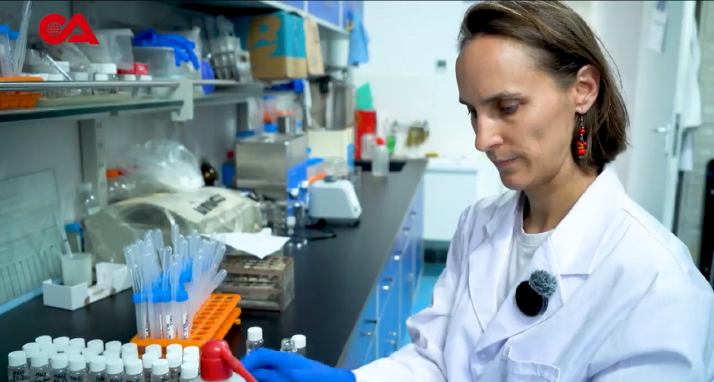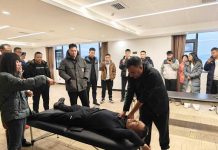How beautiful the jasmine is!
A sweet smell covers the budding twigs.
So fragrant, so white, and admired by all…
On June 10, the renowned Chinese folk song Jasmine Flower, or Molihua, filled a music hall in Chaoyang District, Beijing. A choral concert was held to celebrate the 60th anniversary of the establishment of diplomatic relations between China and France.
One of the performers on stage was Marie-Luce Chevalier from France and Belgium, who has dedicated four years to practicing with the choir. In addition to singing, she also loves hiking, traveling and participating in Spartan races. She also plans to learn calligraphy in the future.
“I tried it before and it was not good at all, but it would be fun to be able to write beautiful characters,” she told Beijing Review, adding that she likes trying new things and sharing them with her family.
Living in China with her husband and daughter, Chevalier considers the country to be her second home. “I have adapted quite well to life in China—around 80-90 percent—as I have been coming to China for over 20 years,” she said.

An observer of Earth
Alongside her many hobbies and interests, Chevalier is also working in China to unravel the secrets of earthquakes.
Chevalier is a research professor at the Institute of Geology of the Chinese Academy of Geological Sciences. Following her post-doctoral research at Stanford University in 2010, she joined the institute to continue her research on earthquakes on the Qinghai-Xizang Plateau and its fault zones.
This region is one of the main areas in the world where intracontinental earthquakes occur, with its seismic activity both frequent and highly regular.
Chevalier’s work focuses on faults on the plateau—how fast and how often they move, how large past earthquakes may have been and future ones may be. She hopes her work will improve earthquake early-warning systems, saving lives and mitigating damage.
A researcher
The Qinghai-Xizang Plateau, often referred to as the third pole of Earth, took shape approximately 50 million years ago. The geological activity in this region has profound impacts on climate, hydrology and vegetation, both in China and around the world.
According to Chevalier, Earth is akin to a massive jigsaw puzzle covered by tectonic plates. Its surface is constantly moving, similar to pieces of a puzzle that can freely slide, come together, or collide. This dynamic movement leads to the creation of breathtaking landscapes such as mountains and rifts, as well as geological phenomena like earthquakes.
“We collect samples from the surface, map faults and measure topography in an effort to understand how the landscape formed,” she said. Once back in their laboratories, geologists conduct chemistry experiments on these rocks to determine their age. With these results, they can estimate the slip rate of the fault—the rate at which the two sides of the fault slide past each other—and its level of activity.
Conducting outdoor research on the plateau presents numerous challenges. Chevalier and her colleagues often work at altitudes of around 4,500 meters and camp out in tents on nights with frigid temperatures. However, she said it is her favorite aspect of her work, “I love being outside in nature looking at its beautiful landscapes. I also enjoy hiking for work,” she said.
Chevalier said conditions have improved significantly now that they are able to sleep in comfortable beds and enjoy hot showers after spending whole days hiking and carrying heavy rocks in the field—especially when it’s snowing or raining.
Chevalier this year began a new project in the southeastern part of Yunnan Province. There exists in the province a significant active fault called the Red River Fault which follows the Red River, or Honghe, all the way down to Hanoi, Viet Nam.
This fault gives the appearance of being very active, but no earthquakes have occurred along it in the last 2,000 years, Chevalier said. “As many big cities are there, like Kunming and Dali, it will be very devastating if an earthquake happens,” she added.
Activities within fault zones account for approximately 90 percent of the world’s earthquakes, leading to significant changes in the planet’s crust. It is essential to comprehend their operational mechanisms and development speed in order to assess potential risks. However, this task is challenging due to numerous manmade agricultural terraces concealing the underlying geology.
In 2021, Chevalier was presented with the Chinese Government Friendship Award in recognition of her efforts in improving China’s seismic disaster assessment system and promoting cooperation and exchange between China and other countries.
An easy-going teacher
“My typical day involves a significant amount of time spent analyzing satellite images, conducting fieldwork, performing laboratory experiments, attending meetings, presenting our findings at conferences, and mentoring students,” Chevalier said. She has supervised five students.
This May, she attended the doctoral defense of her fourth student, which brought back memories of her own experience. “I remember when I defended my dissertation many years ago. I was very nervous and spoke quickly without taking proper breaths. However, after numerous experiences since then, I have become more composed,” she said.
She also mentioned that she is more passionate about her research now than when she was a student, as she has more control over it and also the funding that supports it.
Chevalier does not like the traditional hierarchy between students and teachers in oriental culture. By treating her students as friends, she hopes they will feel comfortable coming to her for help.
“I have students who don’t necessarily follow my exact path, and I also learn from them,” she said. She emphasized the importance of being open-minded and selfless, viewing her work as collaborations not only with her students but also with colleagues in the field. It’s important to be curious and ask questions, such as why something isn’t working, she continued.
“Then keep observing. Observe what’s around you. When you notice things, wonder why they are the way they are. Stay curious about everything,” Chevalier concluded. –The Daily Mail-Beijing Review news exchange item






